Tom Dumoulin: How victory at the 2017 Giro d'Italia confirmed his Grand Tour talents
Time-trial specialist explains how winning the maglia rosa changed his life
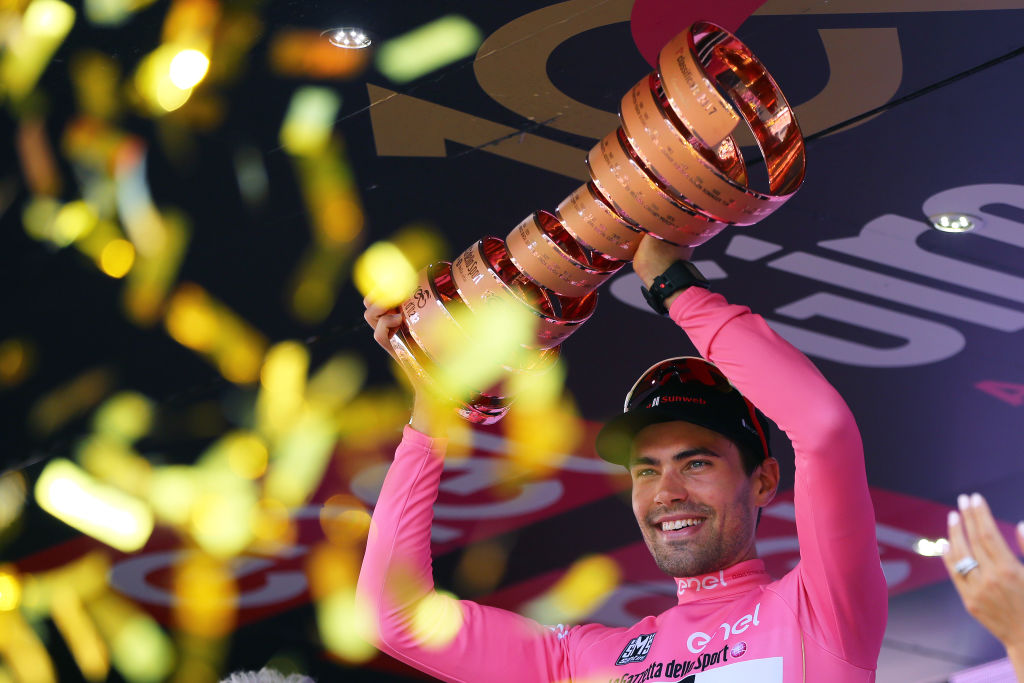
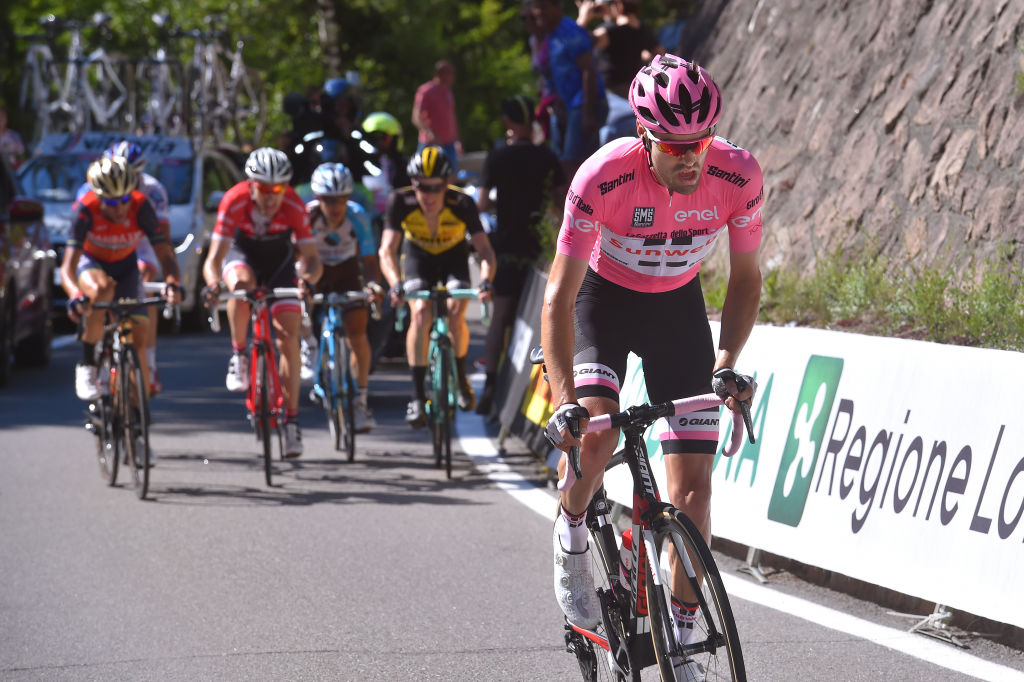
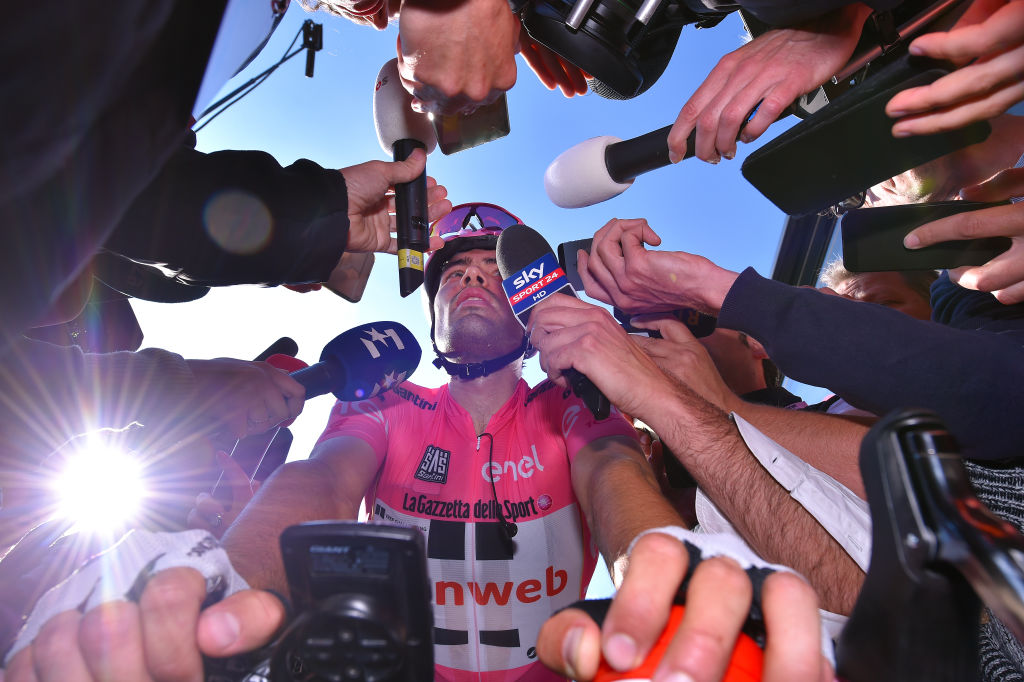
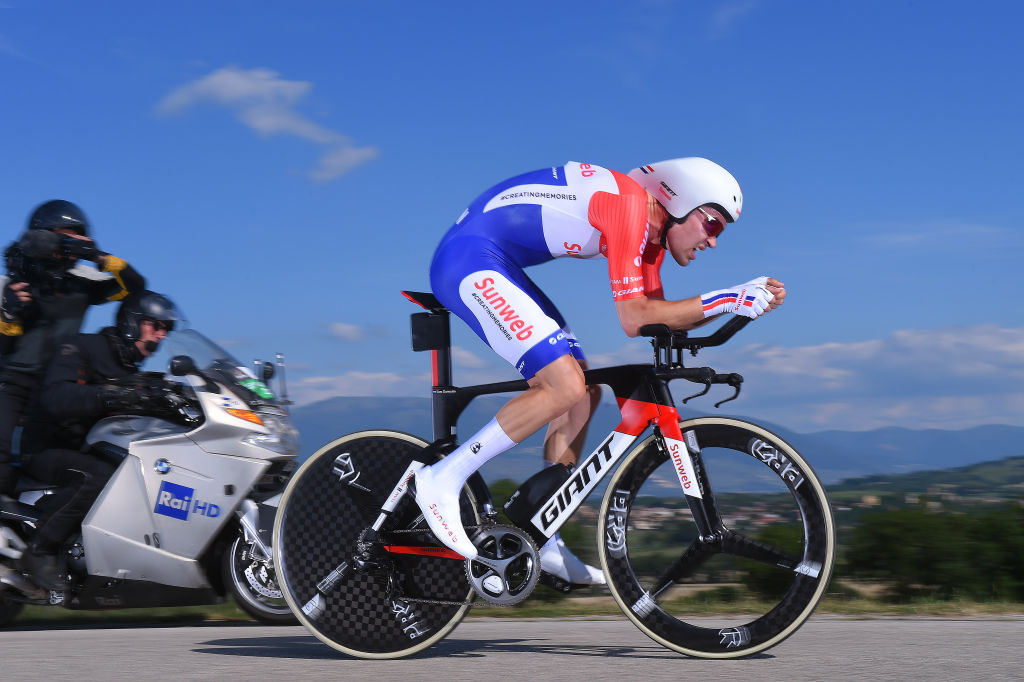
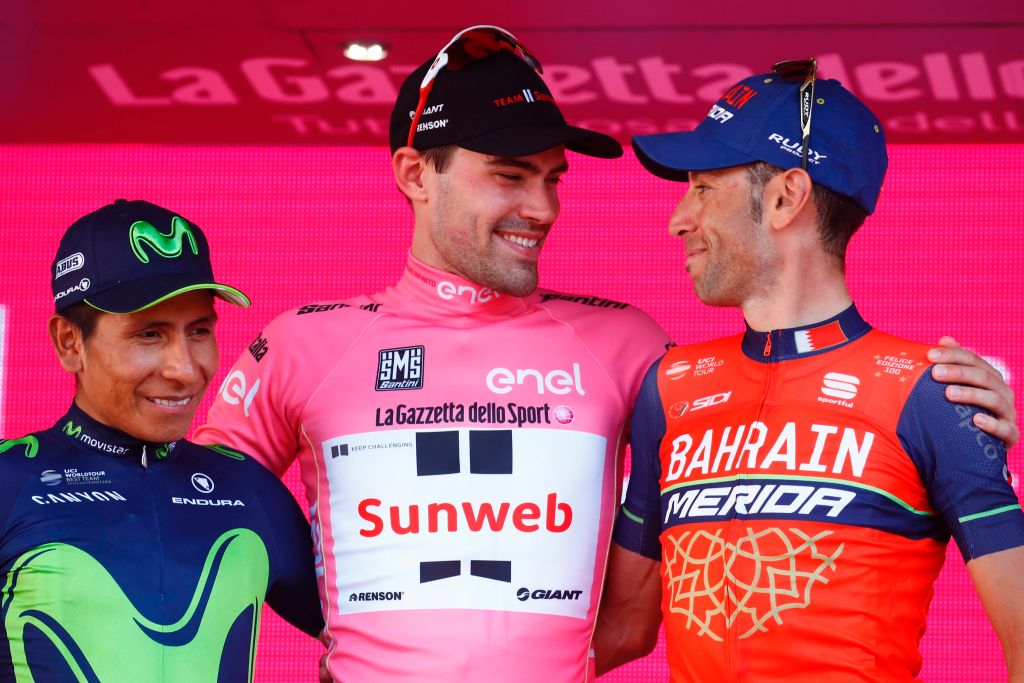
Procycling magazine: the best writing and photography from inside the world's toughest sport. Pick up your copy now in all good newsagents and supermarkets, or get a Procycling print or digital subscription, and never miss an issue.
When Tom Dumoulin pulled on the maglia rosa in Milan in 2017, he became the first Dutch rider to win the Giro d'Italia, and his popularity boomed at home. When Procycling magazine interviewed him at the Tour de Suisse a couple of weeks later, they found a rider still coming to terms with the significance of his achievement.
This article first appeared in Procycling magazine issue 232, published in 2017.
After Tom Dumoulin won two stages of the 2016 Tour de France, Sunweb's general manager, Iwan Spekenbrink, predicted his rider could be mounting realistic GC challenges for Grand Tours in 2018. But here we are, opposite Giro d'Italia-winning Dumoulin, in June 2017, at least a full year ahead of anyone's most optimistic schedule – including the 26-year-old's.
In winning the Giro, Dumoulin became the first Dutch winner of the maglia rosa and the first Dutch winner of a Grand Tour in 37 years. It was also his first professional stage-race victory – a distinction he now shares with one other active rider, Fabio Aru.
"To win it is something unexpected – but really great," Dumoulin tells Procycling on a hot Sunday morning in early June. "I would have been very happy with a place between five and 10 on GC, with maybe winning a stage and the TT. That would have been a successful first step," he said before remembering to add a caveat about his sixth place at the 2015 Vuelta a España, where he spent three spells in the red jersey. There, he came within two mountain passes of winning, before Aru and Astana finally cracked him.
Since the Giro, it has been a whirlwind fortnight for Dumoulin as he and his Sunweb team made the most of the exposure granted to the latest rider to become a bona fide star in the world of cycling. There have been off-the-bike appearances and a festival in his honour. He'd turned up at the Hammer Series at the Limburg Sportzone complex to find a bike park had been named after him.
Get The Leadout Newsletter
The latest race content, interviews, features, reviews and expert buying guides, direct to your inbox!
Then it was on to the next thing, the Tour de Suisse, where we met him. The previous afternoon, he'd stirred himself for the prologue and finished fifth, but mentally he was frazzled. He and his team wondered when, not if, he'd finally call it a day after a tense but dramatically successful first half of the season.
"This is the most relaxing day I've had in the past couple of weeks," he tells us on the terrace, where the local Swiss are having their healthier equivalent of the Sunday lunch: a family brunch. We apologise for ruining the comedown and he just laughs. "Even with an interview it's decompressing," he assures us.

Over on another table, a cadre of Sunweb riders sit with their feet on the table, talking among themselves. Dumoulin explains that inside the team, the environment is exactly as it was before the Giro.
"Some guys I haven't seen before now have congratulated me, but that's it. Now we're racing, I'm the same guy. I'm being treated the same. I don't have the suite in this hotel and so actually around the team it's the same. And also around my family and my friends it's completely the same."
His home city of Maastricht came to a happy, celebratory standstill to welcome him home with the Trofeo Fine Senza, the Giro's famous spiral trophy. Thousands, perhaps tens of thousands, of locals dressed in pink crammed into the Grote Markt for the impromptu festival. He was made a Limburger of Merit. As the confetti cannons boomed and Jan Janssen and Joop Zoetemelk, the Netherlands' two previous Grand Tour winners, congratulated him on stage, Dumoulin was gracious enough to enjoy the moment. But it did look awkward at times.
"It's crazy at home," he adds without prompting. "I have the feeling that I didn't mentally come down from the Giro. Usually I have some time after a Grand Tour to mentally and physically come down and then hit it back up. Here at the Tour de Suisse, I had the feeling I didn't have time, so I'm just taking my time now," he says in his slow but immaculate English.
Tom Dumoulin is talented, good-looking, extremely well-spoken and, as has often been remarked by the journalists who have interviewed him – or even merely listened to him in a press conference – properly interesting. Dumoulin tells us he's a "man of discussion". Disregarding the fact it pertained to sorting out differences in the team, the 26-year-old engages his brain whenever he speaks in a way few others do. He's a refreshingly candid interviewee.
"I came back after the Giro and there were 30 journalists swarming around my house. It was terrible. I couldn't go home for days," he reports. "The celebrating in Maastricht was crazy, but then that also showed me what I really did, that it was something we hadn't had the experience of for a long time in the Netherlands."
It hasn't been a seamless adjustment.
"People, especially in the Netherlands, of course, treat me differently when I walk through the city – then you notice, maybe I did something big. That's also the most difficult thing for me, actually. I never wanted to be somebody's hero. I'm having a bit of trouble being… I would like to be anonymous walking through the city, but it's not possible anymore. I will just have to find a way of dealing with it."
Move to Monaco, we suggest.
"Ha. No. No, that's not in the plan."
We talk to Dumoulin about the Giro.
"The biggest lesson I learned?" he says, just checking he'd heard our question correctly. And as he looks up and to the right and sighs, he says, "Oh, so much, so many lessons."
If Dumoulin had romped home with the pink jersey, things may have been different, the win a little less lustrous. The hard battle all the way to Milan gilded the result. This really was a Giro for the ages: a fourth-placed rider going into the final stage had never won a Grand Tour; the top five were within 1:15 after stage 20. The podium was completely reshuffled after the final time trial.
There were five riders within two minutes of each other at the end of the race. It was only the ninth time in any Grand Tour the top three on GC were within a minute of each other at the finish. But for all the excitement of the denouement, despite the exoticism of the island-hopping start and the visit to Mount Etna, the Giro slumbered in its early part. The race only roused when it hit the Blockhaus climb on stage 9.
There, Movistar's Nairo Quintana became the man to beat with a consummate climbing performance that promised much for the rest of the Giro, but on which he failed to build. At the Blockhaus, Dumoulin lurked, at 30 seconds. It was an excellent performance. The Dutchman struck back two days later when he obliterated the field in the time trial at Montefalco. He rode the tough 39.8km test 5s/km faster than Quintana and 2s/km fast than Vincenzo Nibali. The pink jersey was his along with a 2:23 buffer.

It set the race up for the final 11 days, six of which were in the mountains. Every mountain stage was dissected, analysed and judged as to whether it was defendable or a sure trap for the Sunweb man. Four days after the TT, at Oropa, he out-climbed everybody, including Quintana, and gained more time. His lead reached 2:47 – its maximum. But from there on in, the Dutchman came under siege. To Bergamo, Bormio, Ortesei, Piancavallo and Asiago, he was tested. He bent and buckled but he didn't break.
"I just didn't give up when I had bad legs in the last week," says Dumoulin. "I just always continued, and that's been the biggest lesson. You always continue, you always fight; then, even with bad legs and a bad mental state of mind, it is still possible to do really well."
Of course, the nature break – the 'poep incident', on stage 16 – was also the moment the Giro became a thriller. Numerous euphemisms have sprung up for the most famous mid-race defecation since Greg LeMond's use of a casquette during the 1986 Tour, and Dumoulin has heard them all. He is unembarrassed by questions about it.
"I have no bad feelings about that," he says.
A similar urgency gripped Dumoulin at the bottom of the Col de Peyresourde at last year's Tour. The following day, he won the stage to Arcalís. That time there was a campervan for privacy; at the Giro, only a Swiss ditch banking and the cameraman's good grace to finally lower his lens. Still, it's the second time it has happened. Various reasons were posited for why Dumoulin's need became so pressing: the altitude the race had passed (they'd just been over the 2,757m Stelvio), or what he'd eaten.
"I think it was all those things in combination," he says, adding one of his own. "Everything inside was tired. It's the third week, so the body is already under a lot of stress. Maybe I ate more gels than usual. And immediately after the Stelvio, when my body was in full stress, I ate a bar, which I shouldn't have done. I wasn't sick at all," he says, with emphasis. "I just need to be more careful with my food intake, and ensure that it's the right food."
'I don't get angry or sad quickly, so I can handle a lot of situations'
Until the foot of the Umbrailpass, Dumoulin had been untroubled by time loss, bar Quintana's explosive display on the Blockhaus and a time bonus ceded to the Colombian in Bergamo on stage 15. But after the indecision of his rivals on the lower slopes of the Umbrailpass had passed, it was open season.
"My rivals saw it and they tried everything to crack me," says Dumoulin. For five days almost on the trot, he was harried and harassed. Stage 18 to Ortesei felt like a win.
"They attacked me from all sides but I was feeling good."
The next day's slog to Piancavallo, on what looked like relatively suitable terrain, was his jour sans.
"I had terrible legs that day. I almost lost the jersey because I was too far back on the downhill. I was feeling bad all day and I limited my losses to a little over a minute. That was the most important day."
On the Giro's evidence, Dumoulin rides well under duress. He avoided the mistakes of riders like Cadel Evans at the 2008 Tour and Thomas Voeckler at the 2011 Tour when they panicked and chased moves.
When Dumoulin says, "I'm not a very emotional person," it could be an utterance to chill the blood of any interviewer. But he's not being obtuse or guarded, he's just stating his patience.
"I don't get angry or sad quickly, so I can handle a lot of situations. But in the last week, I was also angry."
There were at least three incidents where his mood darkened: anger at losing Wilco Kelderman, his most trusted mountain helper, on the Blockhaus after a seemingly avoidable accident involving a poorly parked race motorbike. He was also frustrated with the ordeal on the Umbrailpass, which cost him two "unnecessary" minutes. But he really blew his lid in a furious outburst against Nibali and Quintana when they didn't chase Ilnur Zakarin and Thibaut Pinot – their rivals as well as his – on stage 18.
"I hope [they] will lose their podium spots for only focusing on me," he said.
"Does he know what karma is?" Nibali bit back menacingly.
Dumoulin regrets not reining back, but the reason is telling.
"An hour later… it wasn't necessary. I just wasn't happy about Nibali and Quintana, but it didn't give me more energy to give an interview like that; it cost me energy. Of course, the media jumped on it and for a day it was the big Nibali-Dumoulin fight. They could smell blood. It didn't affect me, but it didn't give me any more energy."
The orchestrated rapprochement for the cameras happened the next day, and all three made the podium, but it didn't look like much bridge-building had taken place.

Dumoulin was far from isolated. Allies of circumstance emerged at his most dire moment. On stage 19, LottoNL-Jumbo put men on the front of his chase group for a period when by rights the pink jersey should have taken the responsibility. The next day, up the Foza and on the undulating 15km to Asiago, Adam Yates, Bauke Mollema and principally Bob Jungels helped peg a gap to Quintana, Nibali, Pinot and a couple of other outlying threats.
"They were pretty much not really fighting anymore for any spots on GC, because they were pretty much fixed on their spots, so it was definitely to help me," he said. "I'm very happy about that and thankful."
All that was left was the final 29km TT to Milan, where the 53 seconds and three positions that separated him from the pink jersey were a formality. In the end, the race was over just after the first time check when Aike Visbeek, the team's DS, got on the radio and told Dumoulin to back off.
"No risks," came the command.
Dumoulin would contest the point, because he's been at pains to credit his team, but there was something very individual about his win. His advantages were gained against the clock. He defended stoically, often with teammates in absentia. With which was he happiest: the way he gained time or the way he defended?
"Both," he says, unequivocally. "The attacking thing on Oropa, or whatever, that is actually the most impressive thing in physical terms. But how I handled the last week without having the best legs on some days, how I handled that is actually the biggest step I made in this Giro."
You just know Dumoulin is a good man in a crisis.
Procycling magazine: the best writing and photography from inside the world's toughest sport. Pick up your copy now in all good newsagents and supermarkets, or get a Procycling print or digital subscription, and never miss an issue.
Follow @Procycling_mag on Twitter.
Sam started as a trainee reporter on daily newspapers in the UK before moving to South Africa where he contributed to national cycling magazine Ride for three years. After moving back to the UK he joined Procycling as a staff writer in November 2010.